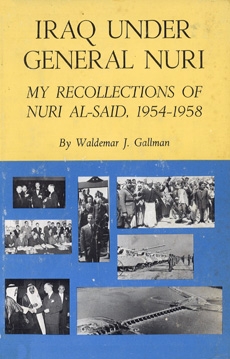 Iraq Under General Nuri
Waldemar J. Gallman
The Johns Hopkins Press
General Nuri al-Said was one of the Middle East’s most able statesmen in this century, one of Nasser’s chief rivals for Arab leadership and power. Unfortunately for history, however, he kept few records of his activities, even while in office.
These recollections, written by the former United States Ambassador to Iraq, come from the author’s almost daily associations with Nuri from 1954 to 1958, crucial years for Iraq and the Middle East generally. Several issues discussed by the author have never been made public until now—particularly the plight of Anglo-American relations in Iraq from 1954 to 1958.
Dictatorial and generally unpopular, Nuri was anti-Communist and pro-West, with deep understanding of the United States. His contributions to Iraq’s welfare went far beyond political achievements.
The author is critical of former Secretary of State Dulles and of American policy on the Middle East in regard to the Baghdad Pact. He relates how Dulles instructed him to approach the Iraqis enlisting their support for a Northern Tier Defense Arrangement. Finding enthusiastic support for the Pact, Gallman then learned that Dulles had lost interest and the United States refused to join, greatly compromising Iraqi and other Middle Eastern supporters who had expected American backing and membership.
A controversial chapter on "The British in Iraq” accuses Britain of frequently furthering her national interests rather than those of Iraq.
Mr. Gallman has written principally a report from the viewpoint of diplomatic history. His interpretation of Nuri as a true Iraqi patroit, Arab nationalist, and statesman is an authentic and colorful addition to the literature of recent Middle Eastern affairs.
Waldemar J. Gallman has held important posts for the State Department in Cuba, Costa Rica, Ecuador, Latvia, and the Free City of Danzig. He held the rank of Minister in London and was the United States Ambassador to Poland, the Union of South Africa, and Iraq. He also served as Director General of the Foreign Service and was a member of the faculty, graduate of George Washington University. He is presently acting as Adviser for the Korean Foreign Service Training Institute of Seoul.
Contents
Preface / vii
Introduction / xi
I Iraq, 1954 / 1
II Nuri’s Background / 9
III Meeting Nuri / 15
IV Prelude to the Baghdad Pact / 21
V The Baghdad Pact / 66
VI Nuri’s Domestic Policy / 88
VII Nuri as Arab Nationalist / 133
VIII Nuri on Israel / 167
IX The British in Iraq / 172
X The Americans in Iraq / 182
XI The 1958 Coup and Its Aftermath / 200
XII The Nuri I Knew / 219
Epilogue / 291
Suggested Background Reading / 272
Index / 233
PREFACE
My work on Nuri was written after my retirement from the Foreign Service. It is based largely on my personal notes and recollections covering the four years I was ambassador to Iraq, 1954-58, and on talks with Iraqi and American friends of mine who knew Nuri and understood the situation in Iraq. It is in no sense an official publication. The views and observations appearing in it are my personal ones.
For some valuable information appearing in my study on Nuri and for helpful suggestions on its content and form I am especially indebted to Dr. Majid Khadduri, distinguished authority on the Middle East, formerly on the faculty of the Higher Teachers College and the Law College of Baghdad and later professor at The Johns Hopkins School of Advanced International Studies, and Director of Research at the Middle East Institute, Washington, D.C.; to Mr. Hermann Eilts, a Foreign Service officer who served with me in Iraq and who subsequently was assigned as Middle East specialist to the American Embassy, London; and to John Gatch, a Foreign Service officer who had also been a member of my staff in Iraq and who was later attached to the Office of Near Eastern and South Asian Affairs of the State Department. Their help and encouragement made this work possible.
Waldemar J. Gallman
Washington, D.C.
1963
Introduction
This is the story of Nuri al-Said as I came to know him through almost daily contact over a period of four years. My association with him began in the autumn of 1954, shortly after he became prime minister of Iraq for the thirteenth time. It continued until a few days before his violent death at the time of the Qasim military coup in the summer of
1958. The last four years of his life were crowded ones for him and crucial ones for Iraq and her neighbors.
Nuri himself, unfortunately, kept few records of his activities even when in office, and that was for most of his life. During the last years he was repeatedly urged by his intimates to write his memoirs. He half promised to do so but was too engrossed in the problems of the day to make a start. He left texts of his public speeches and statements, some scattered letters, and his short work, Arab Independence and Unity, better known as “The Fertile Crescent Plan.’’ Because of this dearth of material giving insight into his character, personality and views, I felt impelled to record my impressions of him as I observed him working during his last years on the problems critically affecting Iraq and her neighbors. My story covers only a brief portion of his life. Even so, I hope ...
Waldemar J. Gallman
Iraq Under General Nuri
The Johns Hopkins Press
The Johns Hopkins Pressww
Iraq Under General Nuri
My Recollections of
Nuri al-Said, 1954-1958
by Waldemar J. Gallman
The Johns Hopkins Press, Baltimore
© 1964 by The Johns Hopkins Press,
Baltimore, Maryland 21218
Printed in the United States of America
Library of Congress Catalog Card No. 63-19559
|